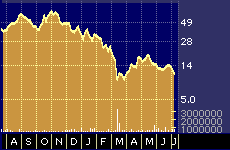
Sonic Foundry Stock Seen Extending Run
Sonic Foundry Stock Seen Extending Run
by Hal Plotkin
Silicon Valley Correspondent
Analysts say Sonic Foundry Inc.’s {SFO} stock, which doubled in price this week despite the Internet-sector selloff, continues to have strong upside potential.
“Sonic Foundry is going to be a great story and company,” says John Todd, an analyst at C.E. Unterberg Towbin, based in San Francisco.
Todd’s “strong buy” recommendation and $80 12-month price target helped send the stock soaring on Tuesday, a day when many other popular Internet stocks got hammered.
About two weeks earlier, on Dec. 22, H.C. Wainwright & Co. analyst Jason Noah Ader, based in Boston, also issued a very positive research note on the company, setting a six-to-nine-month price target of $30 a share, which he raised to $55 earlier this week.
“It was pretty clear to me the stock was undervalued,” Ader says. “Then Unterberg picked it up, and it blew right past my target. It turns out $30 was conservative.”
One of the factors fueling interest in Sonic Foundry’s stock are expectations the company will soon announce significant new clients for its newly established media-services division.
“We anticipate that Sonic Foundry in early 2000 could significantly expand its recently established Media Services business in conjunction with major media and Internet partners/investors,” Todd wrote in his recent research report. “Sonic should be able to leverage its leadership position in broadband video encoding and well-entrenched media relationships into a long-term dominant role as the leading provider of encoding services for Internet media worldwide.”
Todd, an Internet-infrastructure stock specialist, has been riding a winning streak lately. He issued a “strong buy” rating on Optibase Ltd. {OBAS} back in late June, for example, when the stock was changing hands at about $7 a share.
Post-IPO chart for OBAS
Other notable Todd winning picks include “strong buy” recommendations last September on Proxim Inc. {PROX}, then trading at $39, and Puma Technology Inc. {PUMA}, then trading at $14.

One-year charts for PROX (left) & PUMA
“I feel the same way about Sonic Foundry,” Todd says. “The stock is sorely undervalued at its current price level.”
Madison, Wis.-based Sonic Foundry is one of just a handful of companies that make universal digital-authoring tools for Internet-based multimedia broadcasting.
Sonic Foundry’s tools make it possible for media-content providers, such as broadcasters, movie studios, or recording companies, to use one software tool to encode their digital wares in all three of the most commonly used streaming media formats, Microsoft Corp.’s {MSFT} Windows Media Player, Apple Computer Inc.’s {AAPL} Quicktime and RealVideo Corp.’s RealPlayer.
“It greatly simplifies the process,” says Edmund Ha, an analyst with Giga Information Group, based in Boston. “The individual streaming media companies don’t have any interest in helping customers use other formats. They’ll help you encode your media in their format. But most Web sites that offer media do it in more than one format. It saves them a lot of time if they can do it with just one tool.”
The analysts tracking the company say the trend toward outsourcing is also likely to help Sonic Foundry, which has set it sights on generating significant revenue from customers who would prefer to let the company handle the task of digitizing any media they wish to offer online.
“That business model makes a lot of sense,” says Greg Howard, principal analyst at High-Tech Resource Consulting Group, based in San Andreas, Calif.
Howard says the needs of Web-site operators are rapidly outpacing their ability to keep up, particularly for multimedia Web sites. The information downloaded from Web sites is increasing by 8.4 percent a month, while Web-site operators say they only plan to increase staffing by 12 percent over the next year, according to a recent survey of 100 major Web sites conducted by his firm. “There’s a big imbalance that will mean more outsourcing. It’s becoming a requirement in many cases,” he says.
A handful of competitors, most notably Loudeye Inc., based in Seattle, and Marlboro, Mass.-based Media100 Inc. make similar digital-media authoring tools.
But Sonic Foundry’s tools appear to be in the lead, having produced more than 50 percent of all the streaming media content now on the Web, according to Todd.
“There’s going to be so much demand for these services that both companies will have enough business to do well,” Todd says.
Sonic Foundry posted a loss of $1.8 million on revenue of $5.1 million for the fiscal fourth quarter ended Sept. 30, compared with a loss of $1.3 million on revenue of $4.2 million during the previous quarter.


